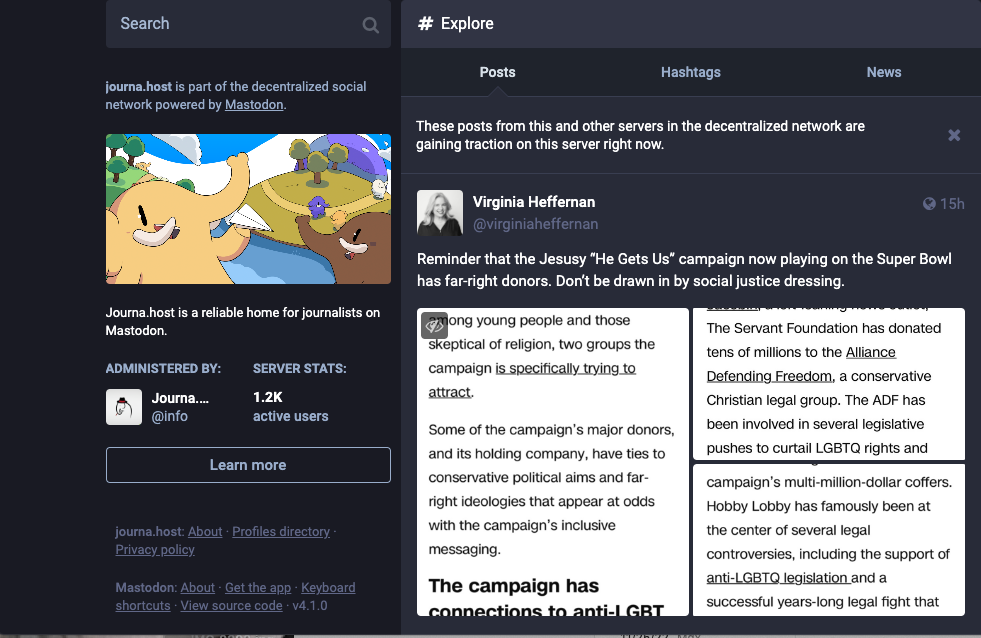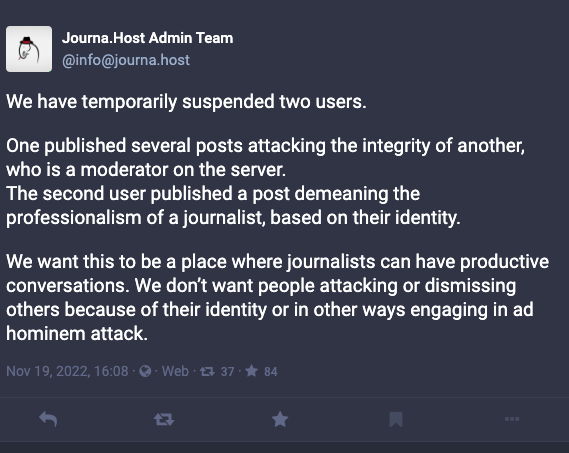Adam Davidson talks Mastodon, @Journa.Host, and content moderation
You may recognize Adam Davidson from NPR’s “Planet Money” podcast or his reporting in The New York Times, The New Yorker, or Harper’s — to name just a few of the outlets he’s been published in. Davidson is one of the most successful economics reporters of his generation and has made a name for himself pushing the boundaries of journalistic mediums. Whether that be creating a Peabody Award-winning podcast episode or writing a critically acclaimed book, Davidson has explored almost every platform journalism has to offer. His latest endeavor: creating one of the first journalism servers on Mastodon — @journa.host — in November 2022.
Mastodon is widely known as a decentralized alternative to Twitter. The number of Mastodon users peaked at 1.8 million around the time when Elon Musk became CEO of Twitter in October of last year. Changing usage patterns on Twitter at this time prompted Davidson and a group of his peers to look at alternative social platforms for sharing journalism.
Storybench spoke with Davidson about what encouraged him to bring journalism to Mastodon, the challenges he has faced so far, and how he hopes to grow @journa.host in the future.
This interview has been edited for clarity and length.

How did you decide to start @journa.host?
Adam Davidson: For quite some time had been rethinking how I was using Twitter and other social media. I, like a lot of journalists, use Twitter all the time and became kind of addicted to it. I think I allowed myself to do things I wouldn’t ever do in a published setting. I’d be more of a jerk, I’d share personal opinions rather than reported facts, I’d get into fights. I concluded that it wasn’t very good for me a while ago, and I started to feel like it almost felt like when I used to smoke cigarettes — like I’m doing these things that are self-destructive because a corporation is engineering things to make that happen.
“I started to feel like it almost felt like when I used to smoke cigarettes.”
Adam Davidson
I was having that rethink [of Twitter] already, and then Musk kind of caused a lot of drama and clearly had an overt contempt for journalism. It started to feel like maybe journalists won’t be using social media [altogether].
But then, I was having some conversations with some journalist friends and we concluded that someone should start a Mastodon server. I had used Mastodon, briefly, four years ago. It wasn’t something I knew well, but as I looked into it I thought it was really cool. It’s designed specifically to avoid some of the things that had messed me up on Twitter. It’s engineered to not be an addictive machine of hate, but rather to encourage more thoughtful conversation. So really, when I actually started the server, it was sort of spur of the moment … And so I just did it on a Friday. It happened to be that week in November that the whole world was seeing Elon Musk destroying the blue check, and so people were desperate for an alternative. So we got a lot of attention right away.
Something that stood out to me while looking through @journa.host’s guidelines is that only verified journalists are allowed to join, although anyone can view the feed. How do you and your fellow administrators verify the journalists who apply to join?
AD: I would say there’s layers [to the process]. Most [applicants] are not very controversial, they work for an accredited news organization, or they’re a freelancer. If they’re a freelancer, we ask for at least three clips from the recent past. There’s some times when it is a judgment call … [journalism] is not a licensed profession. For example, is somebody with a Substack a journalist? And I think we’ve concluded that it depends on what their AppStack is. If they’re doing something like reporting, and if they’re correcting factual errors, then yeah. I think they wouldn’t be a journalist if they’re just somebody sharing their opinion, or not really doing anything that anyone would call journalism. I’d say easily 90-something percent [of applicants], I would guess, are pretty easy calls. Anything that’s not an easy call we asked for at least three members of the admin group to weigh in. Once a week or something, we’ll have a kind of intense conversation about someone. There definitely are some where you could imagine it going either way, it’s not totally obvious what the right answer is.
What is your day-to-day workload and responsibilities like as a @journa.host administrator?
“We became a target because people love to mess with journalists”
ADAM DAVIDSON
AD: It changes over the months that we’ve been doing this. In the beginning, it seemed like it was just a fire hose. There were so many learning [experiences]. We became a target because people love to mess with journalists. So, early on, we got a lot of really ugly spam and nasty trollish-content. Like REALLY disgusting: overt Nazi imagery, racist imagery, truly hideous violent imagery. It took a little bit to learn how to block all of that stuff. Now, every time something happens that embarrasses Elon Musk, we kind of flood [with] incoming [users]. Then, we had to set up all our systems and all our rules. Now, the basic management is pretty simple. It’s probably half an hour a day for [one of the administrators].
For the moderation, there’s a handful [of incidents] a day where somebody will report someone for saying something offensive. We want to respond to those right away. It’s not a huge amount of work. The thing that we’re kind of trying to pivot to, though, is actually [figuring out how to] use this community. How do we create programming events? We’re still figuring that out, but that would take more work. So we’re trying to kind of professionalize a little bit.
What are your plans for the future of @journa.host?
AD: I think of it in three dimensions. I do think the verification issue is a real and important one. it’s not that we want to be the source of verification, it’s quite the opposite. We don’t believe there should be a single source of verification. We like the idea that maybe there would be multiple verifiers, and that’s kind of built into Mastodon … We want to be kind of on the forefront of verification, that’s exciting. So there’s the bucket of verification, and just how do we create a system where people reading media can feel confident that the person who says they wrote it really wrote it? That’s one. Number two is programming. Can we create events? Events for journalists? Events for journalism consumers? We’re going to experiment with a little bit of that. And then the last thing is kind of internally; I’m not aware of any setting with so many different journalists. We have journalists from all over the world, journalists from every size of publication, from tiny and local to massive international. We have sports journalism, meteorologists, and political journalists, et cetera, et cetera, et cetera. What can we do to foster best practices, information sharing, et cetera, among these journalists? So the three buckets are verification, programming, and community building.
Although @journa.host is regulated, it is obviously not spared from controversy. There has not been an insignificant number of other servers that have de-federated from @journa.host due to a variety of concerns. More recently, there has been criticism pointed at you directly that @journa.host allows anti-trans content. How have you been handling these situations?

AD: First off, there’s tens of thousands of servers. As far as we can tell, 40 de-federated. I’d say a handful of those just said, ‘We don’t like journalists,’ and a handful of them had misinformation. On the trans issue, it’s actually very frustrating. It happens to be that our head of moderation is trans, and is not just trans but also writes a leading newsletter about trans journalism. We had a trans member who was very angry at another member of our server and was very aggressive in attacking that person. So the decision was made (I happen to not be part of it) that we actually were going to temporarily suspend both the members. The trans member who we suspended then apologized for her behavior and said she really was very hostile and was behaving inappropriately. I don’t see how what we did was anything other than a model. This isn’t me saying I was so great at handling these situations. It’s easy to read all the posts because this all happened in public. So you don’t have to take my word for it. There was just no truth to it. It wasn’t true … some people made a story that we blocked a trans member for being trans, which is absurd.
How do you think that incident impacted the message of @journa.host?
AD: I think that it may linger. I don’t know. It felt to me like, overall, it was kind of a model of how to deal with these things. I do think I tend to side more with the trans side of this argument. There are people in journalism who have a view that I personally don’t agree with, and they seem to have a special case of views around trans issues … and want to challenge the trans community saying we should be able to say whatever we want on the server. My personal view, not speaking for anyone else, is we are not going to be the place for people who want to [be controversial]. If what you want to do is ask provocative questions to get a big reaction, we’re probably not the place for you, we’re not a good server for you. It doesn’t mean we’ve made some decision about issues or we think that’s a journalistic responsibility.
For reasons I personally have a hard time understanding, there’s this view that it is legitimate to question the very fundamental existence of trans people. If somebody came on our server and was like ‘I don’t believe Jews are really Jews, I believe they’re Kaisars, or whatever,’ of course, we would block that person. We wouldn’t allow that person to be on the server. But for some reason, with trans people, it’s acceptable to talk about them in a way that’s not acceptable to talk about any other group. I don’t understand it, I find it strange.
With places like Twitter or Facebook, there’s sort of this idea that they have to make all the decisions that are right for everyone. I feel like we can make all the decisions that we think are right, we feel we are holding to our journalistic principles. I don’t suppose people have to agree with every single one. But if they disagree strongly enough, then there’s lots of other servers to join. And it’s pretty easy to start your own server.
Learn more about Adam Davidson:
- Adam Davidson talks Mastodon, @Journa.Host, and content moderation - March 21, 2023





